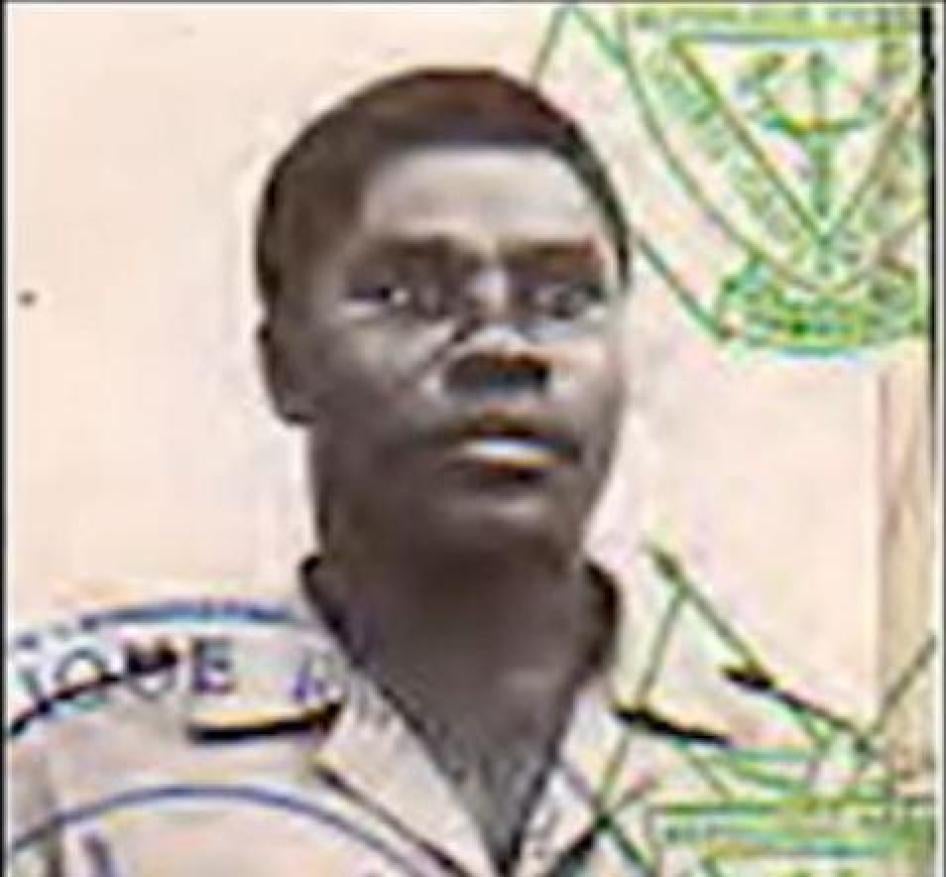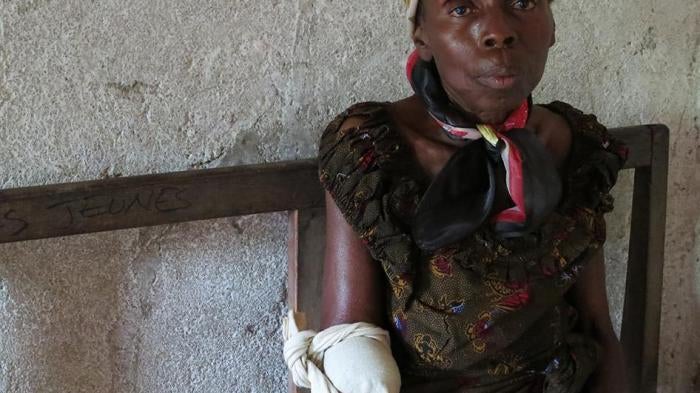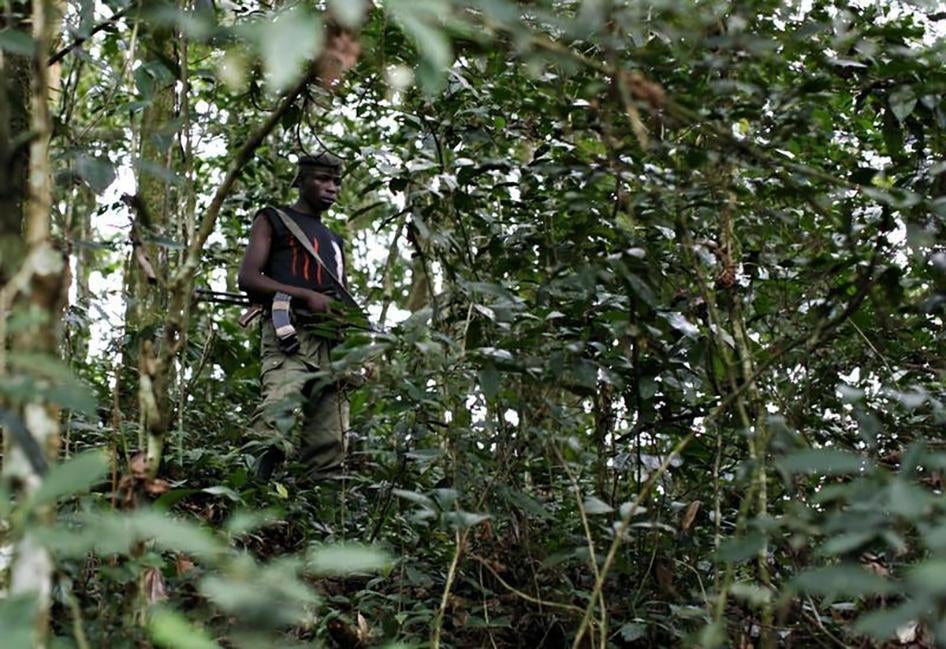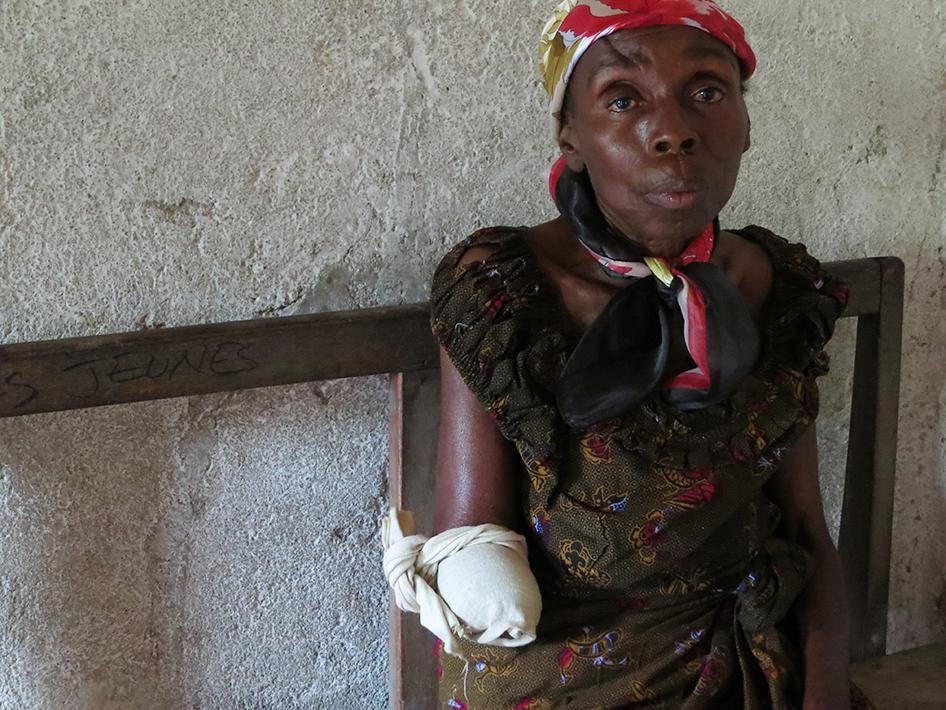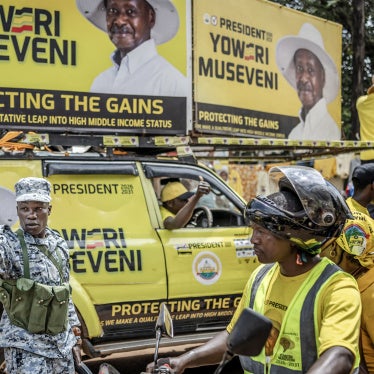(Goma) – The government of the Democratic Republic of Congo and United Nations peacekeepers should urgently act to arrest the rebel leader Sylvestre Mudacumura and transfer him to the International Criminal Court (ICC) in The Hague, Human Rights Watch said today. Forces under Mudacumura’s command continue to be implicated in serious abuses against civilians in eastern Congo.
The ICC issued an arrest warrant for Mudacumura, the military commander of the Democratic Forces for the Liberation of Rwanda (FDLR), on July 13, 2012, on nine counts of war crimes in eastern Congo’s North and South Kivu provinces. The alleged crimes include attacks on civilians, murder, mutilation, cruel treatment, rape, torture, destruction of property, pillage, and outrages against personal dignity.
In new research Human Rights Watch has found that FDLR fighters have killed at least 94 civilians, raped dozens of women and girls, forcibly recruited children into their ranks, kidnapped people for ransom, and destroyed countless homes since 2012 when the ICC arrest warrant was issued. Human Rights Watch has heard allegations of many more war crimes by FDLR fighters during this period.
Those who have sought to expose and denounce the FDLR’s continued crimes have also been killed, tortured, or otherwise threatened. In one incident on January 12, 2015, in Ruhanga, Masisi territory, FDLR fighters killed a school director and his teenage son, whom they accused of having given information about the FDLR to government officials. Their bodies were later found decapitated, with their heads on sticks.
The FDLR is a largely Rwandan Hutu rebel group based in eastern Congo, some of whose leaders participated in the 1994 genocide in neighboring Rwanda. UN experts estimate the group to have around 1,400 active fighters in 2015, compared with 6,000 in 2008.
FDLR forces have been involved in atrocities against Congolese civilians since the group’s inception in 2000. The ICC has sought Mudacumura only for alleged crimes committed between January 2009 and September 2010, when the Congolese army, together with the Rwandan army and later with support from the UN peacekeeping mission, waged a military campaign against the FDLR.
We saw thatched homes burning. We saw a dead woman’s body lying in a pond. A few meters from her, my neighbor’s child had been cut in half. I found my aunt had been killed. Lying next to her body was her grandson, also dead. When I went toward my own home, I saw the corpse of my brother-in-law. Nearby, I saw my brother-in-law’s sister’s body. She had been shot dead with a bullet to the head; her head was completely destroyed. When I got home, all of my children were crying. They told me their mother had been killed. Her body wasn’t in the house, but in the manioc field behind our home. She had been stabbed in the heart and the knife was sticking out of her back. When I saw her there, I started crying with the others.
In July 2012, after a series of military confrontations with the Raia Mutomboki, the FDLR attacked the village of Mundjuli, in Walikale territory, killing 39 civilians and burning 93 houses.
Abductions
The FDLR have also kidnapped people for ransom. A cow herder in Bwito, Rutshuru territory, told Human Rights Watch that his 17-year-old son was kidnapped and later killed by FDLR fighters in early April 2015 after the father did not pay the $3,000 they demanded on time. He later found his son’s decapitated body.
FDLR fighters frequently rob and extort money from civilians living in areas under their control. They abduct and ill-treat or torture people who are unable to pay the “taxes” they demand. A former child soldier with the FDLR told Human Rights Watch he saw FDLR fighters tie up their victims with hands to one tree and feet to another and then beat them until they were “half-dead.” A 25-year-old pregnant woman was so seriously injured by FDLR combatants that she suffered a miscarriage.
A Congolese human rights activist told Human Rights Watch in November 2013 that three FDLR fighters came to his house and took him to their base in Buleusa, in Walikale territory, because he had reported their abuses to local government authorities. The FDLR fighters tortured him to make him name those who were giving him information. When he refused, they threw him into a hole in the ground that they used as a makeshift prison. They kept him there for eight days. “When it rained, all the rain entered into this hole,” the activist said. “I spent the nights there in the mud like a pig.”
Sexual Violence
Like other abusive forces in eastern Congo, FDLR fighters have raped thousands of women and girls throughout their areas of operation, kidnapped many, and forced them to serve as sex slaves for their commanders. The UN secretary-general’s annual report on conflict-related sexual violence lists the FDLR in its annex of parties credibly suspected of committing or being responsible for acts of rape or other forms of sexual violence.
On May 7, 2012, FDLR fighters rounded up and raped more than 30 women and girls from Kipopo village, Masisi territory. Three girls, ages 7 to 11, died after being gang-raped. In November 2012, the FDLR attacked Kipopo village again, this time abducting three women and a baby. A 28-year-old mother of five told Human Rights Watch that she and the others were taken to the FDLR camp and raped repeatedly: “I don’t know how many raped me in total, but probably at least 10 men each day.” She and the others were rescued three days later when youth from her village attacked the FDLR.
FDLR fighters raped a female farmer, 30, from Bukonde, a remote village in Masisi territory, on September 28, 2013, while she was in her field with her young child and 15-year-old babysitter:
All of a sudden I saw three armed men in military uniforms and black boots. They were on the path that crosses my field. They approached me and said in Kinyarwanda [the language of Rwanda]: “You will see how we suffer here.” Then they pushed me hard and I fell to the ground. They immediately started pulling my skirt and tearing my underwear with a knife. One of them raped me and I started to yell, and then the other came on me after him. Afterwards, they took the babysitter, threw the baby to the side, and did seriously bad things to her as well. They left, saying: “It’s not finished. We are going to do horrible things in your village.” That same night around 10 o’clock, the [FDLR] came to our village to loot and burn houses.
Forced Recruitment of Children
FDLR fighters have forcibly recruited hundreds of children into their ranks, including many Rwandan Hutu refugee boys and other FDLR dependents, as well as Congolese Hutu children, among others. The UN secretary-general has identified the FDLR as a “persistent perpetrator” of child recruitment, and for more than ten years, has listed the FDLR for grave violations against children in his annual reports to the Security Council. UN child protection officers documented the recruitment by the FDLR of at least 123 children in 2012, 47 in 2013, 63 in 2014, and 27 in the first quarter of 2015. The actual numbers are likely significantly higher.
Many of the children were abducted during FDLR attacks on their villages. Others were abducted on their way to or at the market, on their way home from school, or while working in the field. Some were family members of FDLR combatants.
A former FDLR fighter told Human Rights Watch that the FDLR attacked the Institute Bumbasha, a secondary school in Rutshuru, in July 2013, kidnapping 13 students (10 boys and 3 girls) as well as two other girls from the village. The fighters forced all of the children to join the FDLR and serve as combatants or forced laborers. They raped at least one of the girls. Around the same time, the same group of FDLR combatants attacked a Protestant church in Kivumo, Rutshuru territory, during Sunday service, and kidnapped five people.
Children in the FDLR have been forced to participate in armed combat, guard the camps, conduct looting expeditions, and collect “taxes” along the road. The youngest children, some as young as 9, are often forced to be porters, spies, and cooks.
One 14-year-old boy who was forcibly recruited by the FDLR told of the violence some of the children endured. He said he saw a senior FDLR commander force a 13-year-old boy into a latrine where he shot him fatally in the head because he was accused of having revealed information about the FDLR.
The Optional Protocol to the Convention on the Rights of the Child on the involvement of children in armed conflict, which Congo ratified in 2001, prohibits any recruitment or use of children under 18 by non-state armed groups.
International Efforts to Bring FDLR Leaders to Justice
The ICC’s arrest warrant for Mudacumura relates to crimes allegedly committed in Congo. Although Mudacumura is a Rwandan citizen, and was a military officer in the Rwandan army during the time of the genocide, he was not indicted by the International Criminal Tribunal for Rwanda (ICTR), the UN-run tribunal set up to prosecute those responsible for genocide and other serious violations of international humanitarian law in Rwanda in 1994. The ICTR, which concentrated on the prosecution of those accused of playing a leading role in the genocide in Rwanda, has nearly concluded its operations.
In September 2010, the ICC had issued a sealed arrest warrant against FDLR executive secretary Callixte Mbarushimana for war crimes and crimes against humanity allegedly committed in eastern Congo in 2009. Mbarushimana was arrested in France in October 2010, but the ICC’s pretrial judges declined to confirm the charges against him for lack of sufficient evidence. He was released from the court’s custody in December 2011. Mbarushimana is also under investigation by a French war crimes unit in relation to alleged crimes committed during the genocide in Rwanda.
Two political leaders of the FDLR, former president Ignace Murwanashyaka and vice-president Straton Musoni, were arrested on November 17, 2009, in Germany, where they had been living for many years, and charged with 26 counts of crimes against humanity and 39 counts of war crimes allegedly committed by FDLR troops in Congo between January 2008 and November 2009. They were also charged with belonging to a terrorist group. Their trial before a local criminal court in Stuttgart, Germany, began on May 4, 2011. The trial is now drawing to an end, with a verdict expected in the coming months.
Three Rwandans accused of leading a diaspora network that provided significant financial support to the FDLR- Bernard Twagiramungu, Félicien Barabwiriza, and Jean Bosco Uwihanganye- were also arrested in Germany, in December 2012, and charged with belonging to or supporting a terrorist organization. They were found guilty in a local court in Düsseldorf on December 5, 2014, after confessing. They received sentences ranging between two to four years in prison.
Ten FDLR leaders are named on a UN sanctions list and subject to a travel ban and asset freezes: Murwanashyaka, Musoni, Mbarushimana, Mudacumura, Gaston Iyamuremye, Léodomir Mugaragu, Léopold Mujyambere, Félicien Nsanzubukire, Pacifique Ntawunguka, and Stanislas Nzeyimana. On December 31, 2012, the UN Security Council’s sanctions committee added the FDLR as an organization to the list of individuals and entities subject to sanctions.
ICC member countries increasingly recognize that there can be no justice so long as those wanted on ICC arrest warrants, such as Mudacumura, are not brought to trial. Discussions are ongoing among member states within the Assembly of States Parties, which provides management oversight of the administration of the ICC, about adopting an action plan on arrest strategies.
